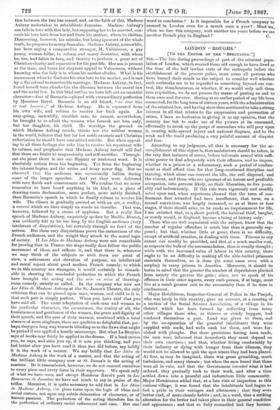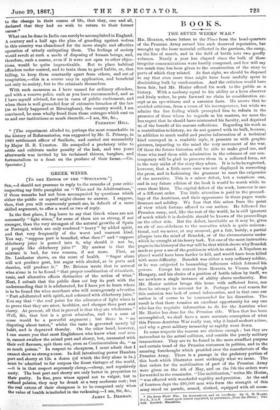LONDON "ROUGHS."
[To THE EDITOR OF THE "SPECTATOR."] SIR, —The late daring proceedings of part of the criminal popu- lation of London, which remind those old enough to have lived at the time of the half lawless state of the metropolis before the establishment of the present police, must cause all persons who
have turned their minds to the subject to consider well whether such outbreaks are to be regarded as something beyond our con- trol, like thunderstorms, or whether, if we would only call them into requisition, we do not possess the means of putting an end to them once and for ever. llaving at an earlier period of my life been connected, for the long term of sixteen years, with the administration of the criminal law, and having since then continued to take a strong interest in all that relates to the suppression and prevention of crime, I have no hesitation in giving it as my opinion, that the country has but to make use of the powers at its command, effectually to break up the gangs of marauders who still prey upon it, causing wide-spread injury and national disgrace, and to the weak and the timid producing a very painful amount of disquiet and fear.
According to my judgment, all that is necessary for the ac- complishment of this object is, that malefactors should be taken, in the very first instance of arrest, before tribunals armed with suffi- cient power to deal adequately with their offences, and to impose, whether in a prison or a reformatory, such a period of confine- ment as shall afford time for that long-continued discipline and training, which alone can convert the idle, the evil disposed, and the violent, and those who are ignorant of an honest and profitable occupation, into persons likely, on their liberation, to live peace- ably and industriously. If this rule were vigorously and steadily acted upon and, when experience showed that the term of con- finement first awarded had been insufficient, that term, on a second conviction, was largely increased, so as at three or four stages, if these should arise, to be made an imprisonment for life, I am satisfied that, in a short period, the habitual thief, burglar, or rowdy would, in England, become a being of history only.
Those who are well acquainted with the subject, know that the
number of regular offenders is much less than is generally sup- posed ; but that, whether little or great, there is no difficulty, except of artificial creation, in dealing with them. Prisons to any extent can readily be provided, and that at a much smaller cost, as respects the bulk of the accommodation, than is usually thought ; while with the increased value of labour in this country, there ought to be no difficulty in making all the able-bodied prisoners maintain themselves, as is done (in some cases even with a surplus) in many prisons in America. Moreover, it should be borne in mind that the greater the number of depredators plucked from society the greater the gain ; since, not to speak of his offences in their other aspects, every such person, if at large, must live at a much greater cost to the community than if he were in confinement.
Major Hutchinson, Inspector-General of Police in the Punjab,
who was lately in this country, gave an account, at a meeting of a section of the Social Science Association, of a village in his district which has been formed by collecting from many other villages those" who, as thieves or sturdy beggars, had rendered themselves a pest. Land was given to them, and by the co-operation of the peaceful inhabitants they were supplied with seeds, had wells sunk for them, and were fur- nished with ploughs. But these provisions having been made, the men were informed that henceforth they must depend on their own exertions ; and that, whether living comfortably by their industry or dying with hunger from their idleness, they would not be allowed to quit the spot where they had been placed. At first, as may be imagined, there was great grumbling, much turbulence, and many threats ; but when the men found that these were all in vain, and that the Government intended what it had ordered, they gradually took to their work, and after a time settled down into a peaceful and industrious little community. Major Hutchinson added that, at a late visit of inspection to this curious village, it was found that the inhabitants had began to feel a pride in their cottages and allotments ; that they were better clad, of more cleanly habits ; and, in a word, that a striking alteration for the better had taken place in their general condition and appearance ; and that so fully reconciled had they become
to the change in their course of life, that they, one and all, declared that they had no wish to return to their former career.* What can be done in India can surelybe accomplished in England. A century and a half ago the plan of guarding against wolves in this country was abandoned for the more simple and effective operation of utterly extirpating them. The feelings of society would revolt at such a mode of disposing of human beings, and, therefore, such a course, even if it were not open to other objec- tions, would• be quite impracticable. But to place habitual offenders under control, and to train them to good habits, or, that failing, to keep them constantly apart from others, and out of temptation,—this is a course easy in application, and beneficial not only to society, but to the criminals themselves.
With such measures as I have named for ordinary offenders, and with a reserve police such as you have recommended, and as I have myself advised, for use in cases of public excitement, and when there is well grounded fear of extensive breaches of the law (as so lately happened at Birmingham), the country would, I am convinced, be soon wholly freed from those outrages which cast on us and our institutions so much discredit.—I am, Sir, &c.,
FREDERIC HILL.
* [The experiment alluded to, perhaps the most remarkable in the history of Reformatories, was suggested by Mr. E. Prinsep, in 1860 settlement officer of Sealkote, and carried out successfully by Major H. B. Urmston. He compelled a predatory tribe to settle and cultivate under penalty of the lash, and two years afterwards was invited by his reclaimed thieves, burglars, and fortunetellers to a feast on the produce of their farms.—ED. Spectator.]































 Previous page
Previous page